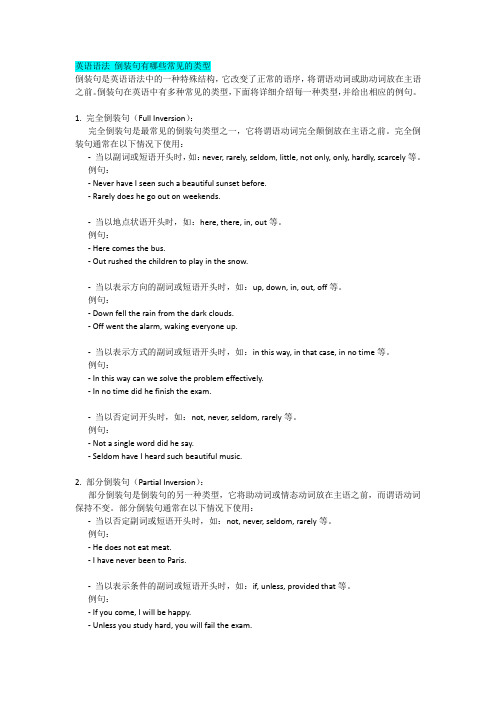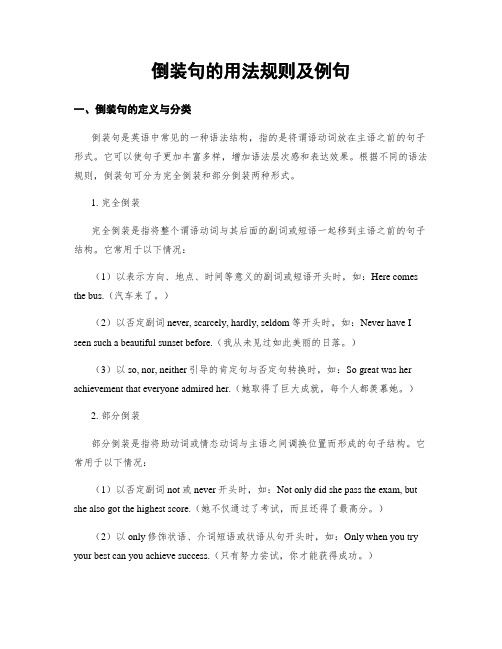英语基础语法2.倒装句
英语语法基础(倒装与从句)

先讲倒装一.概念:英语句子通常有两种语序:一种主语在前,谓语在后,称为自然语序,另一种谓语在前,主语在后,称为倒装语序。
二.相关知识点按“主语+ 谓语”这种顺序排列的句子是陈述语序。
如果排列顺序变为“谓语(或谓语一部分)+主语”,就是倒装。
倒装句分为:完全倒装:整个谓语移至主语前面叫完全倒装。
部分倒装:只把助动词、系动词或情态动词放在主语之前叫部分倒装。
1. 当以there, here, out , in , up , down, away 等副词开头的句子,为了起到强调的作用,可构成倒装句,只把副词放在句首,主语和谓语位置调换,不加助动词。
Our teacher came in. ——>> In came our teacher.这种倒装要求:主语必须是名词。
主语是人称代词时,主语和谓语语序不变。
如 Here it is. A way he went.这类倒装句式一般只用一般现在时和一般过去时。
Here comes the bus.Out rushed the boys.2. how, then, just, often 表示时间的副词放在句首,可构成倒装句,只把副词放在句首,主语和谓语位置调换,不加助动词。
Then came 8 years of the Anti -Japanese W ar.3. 表地点状语的介词短语放在句首,要用倒装句式,以示强调。
这种倒装句也是主谓直接调换位置,不加助动词did, does,do.Under a big tree ___D_____, half asleep.A. did sat a fat manB. a fat man satC. did a fat man satD. sat a fat man4. there放在句首时,要用倒装句式。
在“there + be”结构中的谓语动词有时不用be , 而用表示类似“存在”观念的其他不及物动词。
英语语法知识点:倒装句

英语语法知识点:倒装句英语语法学问点:倒装句英语最基本的词序是主语在谓语动词的前面。
假如将句子的主语和谓语完全颠倒过来,这称之为完全倒装。
假如只将助动词或情态动词移至主语之前,谓语的其他部分仍保留在主语的后面,这称之为部分倒装。
我在这里整理了相关学问,期望能帮忙到大家。
疑问句和特别疑问句要倒装Are you cold?Does he go to school by bike?留意:若疑问词在句中作主语或主语的定语时,不倒装。
Who is your English teacher?Whose father is a worker?There be 句型在There+助动词/情态动词+be+主语+地点/时间的句型中,主语在谓语be动词后面,因此这是倒装。
There is a mobile phone and some books on the desk.桌上有一个手机和一些书。
There are thousands of people gathering on the square.广场上聚集着成千上万的人留意:引导词there 还可以接appear,exist, lie, remain, seem, stand, live 等词。
There lived an old fisherman in the village.村里住着一位老渔夫。
There stand two white houses by the river.河滨耸立着两座白房子。
There existed some doubt among the students.同学中有些怀疑。
直接引语在句首“May I come in and take a rest?” asked the poor girl.“Get out of the room!” shoute d the angry woman.虚拟条件句的倒装当if引导的虚拟条件从句中含有had, were, should等时,如将if省略,则要将had, were, should等移到主语前,构成倒装句:Had you come yesterday, you would have seen him.若你昨天来,你就会见到他了。
倒装句的用法总结

倒装句的用法总结倒装句在英语语法中属于一种特殊句型,它能够使语言表达更加灵活多样。
倒装句的用法有时会让人感到困惑,因此本文将对倒装句的基本形式、用途及注意事项进行总结和解释。
一、什么是倒装句?倒装句是指将英语中主语和谓语动词的位置颠倒的现象。
通常来说,在陈述句中主语位于谓语动词之前;但在某些情况下,为了强调某个信息或改变语气,可以将主语和谓语动词颠倒顺序。
二、基本形式1. 完全倒装:即将助动词、情态动词或连系动词放在主语之前。
Examples:- Had she arrived?(她到了吗?)- Can you swim?(你会游泳吗?)- Is it a cat?(那是一只猫吗?)2. 部分倒装:即将助动词、情态动词或连系动词与其后面的其他成分颠倒顺序。
Examples:- Not only did he finish his homework, but also he helped his classmates.(他不仅完成了作业,还帮助了同学们)- At no time does he admitted his mistakes.(他从未承认过他的错误)三、倒装句的用途1. 当以否定词开头表达“部分否定”的意思时,常常使用完全倒装。
Example:- Never have I seen such a beautiful sunset.(我从未见过如此美丽的日落)2. 在虚拟条件句中,通常采用部分倒装。
Example:- Should you need any assistance, please let me know.(如果你需要任何帮助,请告诉我)3. 在介词短语置于句首时,为了避免重复或强调信息,可以使用完全或部分倒装。
Examples:- Off the table fell a plate.(桌子上掉下了一只盘子)- Into the room walked a toddler and her mother.(一个蹒跚学步的小孩和她的妈妈走进了房间)四、注意事项1. 只有助动词、情态动词和连系动词才能发生倒装。
【课件】2023届高考英语语法基础倒装句课件

3.形式倒装
(2)常见结构 ②as/though引导的让步状语从句
宾语
Boy as/though he was ,he was chosen as king..
3.形式倒装
as,though,although引导让步状语从句
① s引导让步状语从句时,必须倒装; ②though引导让步状语从句时,可例可不倒; ③although引导让步状语从句时,不用例装。
经典练习
On the ground_________,which were to be shipped to some other cities. y some air conditioners B.some air conditioners lay id some air conditioners were in some air conditioners were
We not only enjoyed the class,but also recommended it to our friends →Not only did we enjoy the class,but also recommended it to our friends.
2.部分倒装
(1)常见结构
“如此......以至于......”
such + (a/an)+adj.+n.+部分倒装+that。
So shallow is the lake that no fish can live in it. =Such a shallow lake is it that no fish can live in it.
1.完全倒装
(2)常用形式2 ① 地点介词短语开头(介+名) ② 谓语动词表某种状态(be,stand,sit,lie,hang等) ③ 主语是名词 Betweg. At the meeting place of the Yangtze River and the Jialing River lies Chongqing.
英语语法 倒装句有哪些常见的类型

英语语法倒装句有哪些常见的类型倒装句是英语语法中的一种特殊结构,它改变了正常的语序,将谓语动词或助动词放在主语之前。
倒装句在英语中有多种常见的类型,下面将详细介绍每一种类型,并给出相应的例句。
1. 完全倒装句(Full Inversion):完全倒装句是最常见的倒装句类型之一,它将谓语动词完全颠倒放在主语之前。
完全倒装句通常在以下情况下使用:-当以副词或短语开头时,如:never, rarely, seldom, little, not only, only, hardly, scarcely等。
例句:- Never have I seen such a beautiful sunset before.- Rarely does he go out on weekends.-当以地点状语开头时,如:here, there, in, out等。
例句:- Here comes the bus.- Out rushed the children to play in the snow.-当以表示方向的副词或短语开头时,如:up, down, in, out, off等。
例句:- Down fell the rain from the dark clouds.- Off went the alarm, waking everyone up.-当以表示方式的副词或短语开头时,如:in this way, in that case, in no time等。
例句:- In this way can we solve the problem effectively.- In no time did he finish the exam.-当以否定词开头时,如:not, never, seldom, rarely等。
例句:- Not a single word did he say.- Seldom have I heard such beautiful music.2. 部分倒装句(Partial Inversion):部分倒装句是倒装句的另一种类型,它将助动词或情态动词放在主语之前,而谓语动词保持不变。
倒装句的用法规则及例句

倒装句的用法规则及例句一、倒装句的定义与分类倒装句是英语中常见的一种语法结构,指的是将谓语动词放在主语之前的句子形式。
它可以使句子更加丰富多样,增加语法层次感和表达效果。
根据不同的语法规则,倒装句可分为完全倒装和部分倒装两种形式。
1. 完全倒装完全倒装是指将整个谓语动词与其后面的副词或短语一起移到主语之前的句子结构。
它常用于以下情况:(1)以表示方向、地点、时间等意义的副词或短语开头时,如:Here comes the bus.(汽车来了。
)(2)以否定副词never, scarcely, hardly, seldom等开头时,如:Never have I seen such a beautiful sunset before.(我从未见过如此美丽的日落。
)(3)以so, nor, neither引导的肯定句与否定句转换时,如:So great was her achievement that everyone admired her.(她取得了巨大成就,每个人都羡慕她。
)2. 部分倒装部分倒装是指将助动词或情态动词与主语之间调换位置而形成的句子结构。
它常用于以下情况:(1)以否定副词not或never开头时,如:Not only did she pass the exam, but she also got the highest score.(她不仅通过了考试,而且还得了最高分。
)(2)以only修饰状语、介词短语或状语从句开头时,如:Only when you try your best can you achieve success.(只有努力尝试,你才能获得成功。
)二、倒装句的用法规则1. 完全倒装的用法规则完全倒装句中,谓语动词与副词或短语置于主语之前,其主要规则如下:(1)当以表示方向、地点、时间等意义的副词或短语开头时,将动词移到主语之前。
例如:Out rushed the boys to play football.(男孩们冲出去踢足球。
英语倒装句语法总结
英语倒装句语法总结英语倒装句是一种句法结构,它通过将主语和助动词的位置颠倒,以实现强调、表示条件或修饰的功能。
倒装句在英语中常常用于口语和书面语中,给文本增加了一定的变化和兴趣。
在本文中,将对英语倒装句进行详细总结,以便读者更好地理解和运用这一语法结构。
一、完全倒装句在完全倒装句中,整个谓语动词位于主语之前,这种倒装句一般用于以下几种情况:1. 当以“here”、“there”、“now”或表示地点、时间的副词开头的句子时,倒装句常被使用。
例如:Here comes the bus.There goes John.Now is the time for action.2. 在以表示否定意义的副词或短语开头的句子中,倒装句也常见。
例如:Never have I seen such a beautiful sunset.Not only is she talented, but she is also kind-hearted.3. 在以“only”开头修饰状语从句的句子中,倒装句也经常使用。
例如:Only when you face your fears can you overcome them.Only in this way can the problem be solved.二、部分倒装句部分倒装句中,只将助动词或情态动词放在主语之前,而将主语与谓语动词的位置维持原状。
部分倒装句常用于以下几种情况:1. 当以否定副词“never”、“seldom”或“rarely”开头时,部分倒装句可以被采用。
例如:Never have I been so happy.Seldom does he complain about anything.2. 在以“so”或“such”引导的句子中,为了表达强调,可以使用部分倒装句。
例如:So tired was she that she fell asleep on the couch.Such is the power of love that it can conquer all obstacles.3. 在以“not”开头的句子中,为了增强否定的语气,常常使用部分倒装句。
英语语法之倒装句
2.含有否定的句子 ①否定并列连词nor连接的并列句,后句需要部分倒装。 I'm not tired now, nor am I thirsty or hungry. 我现在不累,不渴也不饿。 ②否定连接副词neither连接的并列句,后句需要部分倒装。 I can't swim. Neither can he. 我不会游泳。他也不会。(连接两个句子)
③介词短语作为地点状语置于句首,后面如果有lie, live,sit,stand, come, go等动词,全句需要完全倒装。 Into the hall came three women. 大厅里走进来三位妇女。 Along the dustyroad came a group of tourists. 沿着这条尘土飞扬的大路,来了一样游客。
③否定副词never,seldom, rarely等置于句首表强调时,需部分 或完全倒装。 Seldom in all my life have I met such adetermined person. 我一生中很少遇到过这样坚定的人。 ④否定词not后跟often,once,ever等副词置于句首表强调时, 需部分或完全倒装。 Not once did wevisil the city on our own. 我们没有一次独自访问这座城市, Not ever was she nervous during the climb to the summit of Mt. Qomolungma. 她在爬上珠穆朗玛峰峰顶时也没有紧张过。
二、倒装句的种类
(一)常见情况
一般疑问句 特殊疑问句 存在句 祝愿句 直接引语置于句首常倒装
(二)特殊情况
1.虚拟语气条件从句如省略了从属连词if从句则需要部分倒 装。 Had I not seen it with my own eyes, I would not h会相信的。
英语语法倒装句ppt课件
二、部分倒装
当as表示”虽然”、 “尽管”时,必须将表语,状语 (副词)或主要动词放主语前.
Though I admire his father much, I don’t like John.
Much as I admire his father, I don’t like John
在主语之前(partial inversion) 。例如:
• Only in this way can you make progress.
Practice : 句型转换 1. Look! The bus comes here. Look! ___H__er_e__c_o_m_e_s__ the bus.
二、部分倒装
4. Not until放在句首,从句不倒装,主句倒装。
They didn’t find the lost bike until last week.
Not until last week did they find the lost bike.
I didn’t realize the importance of time until I entered the university. Not until I entered the university did I realize the importance of time.
二、部分倒装
Not a word did I say to him. Never have I found him so happy. Little does he care about what I said. Seldom do I go to the cinema. Nothing did I see. Not only did he have to type out the answer, but also he has to translated it. Nowhere else in the world can there be such a beautiful place I can't swim. Neither can he.
倒装句语法知识点归纳总结
倒装句语法知识点归纳总结倒装句是英语中的一种句法结构,与普通句序不同,将谓语动词或助动词放在主语之前,从而改变了句子的语序。
倒装句在表达强调、修辞、疑问和条件等方面起到重要的作用。
本文将对倒装句的基本结构、分类、用法和注意事项进行总结和归纳。
一、倒装句的基本结构1. 完全倒装句:将谓语动词或助动词完全放在主语之前。
例:In the garden stood a beautiful flower.Behind the house lies a large garden.2. 部分倒装句:将助动词、情态动词或系动词放在主语之前。
例:He can speak three languages.Never have I seen such a beautiful sunset.二、倒装句的分类1. 谓语倒装句:将谓语动词完全或部分地放在主语之前。
例:She is coming. -> Is she coming?He has never been to Japan. -> Never has he been to Japan.2. 状语倒装句:将表示地点、时间、方向、原因、条件等的状语放在句首,主语和谓语动词保持原来的顺序。
例:Away went the train.In the distance could be seen a tall tower.3. 主从倒装句:主句和从句中的主语-谓语结构进行倒装。
例:Not until she finished her homework did she go to bed.Only when the rain stopped could we go outside.三、倒装句的用法1. 强调句:通过倒装句,可以将句子的某一部分进行强调,常用的结构是完全倒装句和部分倒装句。
例:Not only did he win the game, but he also broke the record.Under no circumstances should you touch the red button.2. 疑问句:直接将谓语动词或助动词放在主语之前形成疑问句。
- 1、下载文档前请自行甄别文档内容的完整性,平台不提供额外的编辑、内容补充、找答案等附加服务。
- 2、"仅部分预览"的文档,不可在线预览部分如存在完整性等问题,可反馈申请退款(可完整预览的文档不适用该条件!)。
- 3、如文档侵犯您的权益,请联系客服反馈,我们会尽快为您处理(人工客服工作时间:9:00-18:30)。
英语语法专题(2)——倒装句倒装句有以下六大类:(1)含有否定意义的副词放在句首引起的部分倒装(2)含有否定意义的连接词置于句首引起的部分倒装(3)“so(nor, neither)+助动词 + 主语”与“so(nor, neither)+主语+助动词”之间的区别以及与“ so + 主语+ 助动词”的句式区别(4)省略if的虚拟条件句以had / were / should开头引起的部分倒装(5)not until 置于句首引起后面句子的部分倒装(6)only 短语置于句首引起的部分倒装【知识要点】主语和谓语有两种顺序:一是主语在前,叫自然语序。
反之,如果谓语在主语前就是倒装语序,又分全部倒装和部分倒装。
全部倒装是把全部谓语放在主语之前,部分倒装是把助动词或情态动词放在主语之前。
1 全部倒装把谓语全部提到主语前面,叫全部倒装。
主要有:1.以here,there,out,in,up,down,away等副词开头,谓语动词多为be,come,go等,则须用全部倒装。
如:There flows a fiver at the foot of the mountain.山脚下有—条河。
2.以then,now,thus开头,谓语动词多为come,follow,begin,end,be,主语又是名词/名词词组,则用全部倒装(若主语是代词,则不能倒装)。
如:Now comes your turn!该你了3.当地点类介词短语位于句首且后有不及物动词be,come,sit,live,stand,lie,exist等时,常用全部倒装。
如:On the ground lay an old man,who was dying.地上躺着一位老人,奄奄一息。
4.such作表语,置于句首,表示“这样的人/事物;上述的人/事物”。
be动词须与后面的主语保持一致。
如:Such is their decision.他们的决定就是这样。
2 部分倒装只把助动词/系动词/情态动词提到主语前面,叫部分倒装。
主要有:1.在疑问句中须部分倒装。
但在疑问词作主语的特殊疑问句里,不用倒装。
如:①Does he speak Chinese?他说中国话吗?②Who is in this room?谁在这个房间里?2.用于以so,nor,neither开头的句子,表示重复前句的部分内容,须部分倒装,且此句的谓语应与前句的谓语在时态/形式上一致,但“so+主语+d0”结构则表示对别人所说的情况加以肯定,它的主语与上文的主语相同,so相当于indeed,certainly。
如:①Mary has learned by heart 200 words,and SO have I.玛丽已经记住了200个单词,我也是这样。
②一The girls study hard.这些女孩学习刻苦。
一so they do.她们的确如此。
3.在以never,seldom,not only,rarely,scarcely,in no way等否定或半否定词开头的句中用部分倒装。
如:Little do I dream of seeing such wonderful scenery.我想象不到会看到这样美妙的景色。
4.only置于句首修饰状语(副词、介词短语)或状语从句等时用部分倒装。
如:Only after the anaesthetist gave the patient an anaesthetic could the operation be conducted.只有在麻醉师给病人实施麻醉以后,手术才能进行。
5.在so…that,such…that句型中,当SO,such引导的结构置于句首时须用部分倒装。
如:So loudly did he speak that even people in the next room could hear him.他说话声音那样大,隔壁屋里的人都能听见。
6.在hardly…when,no sooner…than,not until句型中,主句须部分倒装。
如:Hardly had he arrived when it began to snow.他一到,天就下起雪来了。
7.as引导的让步状语从句结构为:形容词/名词/动词+as+主语+谓语。
如:。
①Tired as he was,he stayed up late.他虽然疲倦,可仍然很晚才睡。
②Explain as I might,I could not make myself understood.尽管我已经解释了,但我还是不被理解。
③Child as he is,he knows a lot.尽管他是个孩子,可他知道很多。
(注意开头的名词前无冠词)8.在省略了if的虚拟条件句中,were,had或should置于句首。
如:Were I in your position,1 would not go.我要是在你的位置上,我是不会去的。
9.however,no matter how引导的让步状语从句。
如:However hard he worked,he couldn‟t sol ve the problem.不管多努力,他就是解决不了那个问题。
…解题要领这种类型的部分倒装结构为:only + 副词 / 介词短语 / 状语从句 + 系动词be / 助动词 / 情态动词 + 主语 + 谓语的一部分 + 其他成分。
之间的区别以及与“ so + 主语+ 助动词”的句式区别(4)省略if的虚拟条件句以had / were / should开头引起的部分倒装(5)not until 置于句首引起后面句子的部分倒装(6)only 短语置于句首引起的部分倒装方法技巧点拨1.要注意倒装句中的主谓一致、时态一致及人称一致等问题。
2.加强理解分析能力,切忌机械记忆,注意知识间的交叉,分清句子成分。
倒装句练习:1._______ and caught the mouse.A. Up the cat jumpedB. The cat up jumpedC. Up jumped the catD. Jumped up the cat2.______ and the lesson began.A. In came Mr BrownB. Mr Brown in cameC. In came heD. came in Mr Brown3. Over _______ , dead.A. rolling the goatB. rolled the goatC. did the goat rollD. the goat rolled4.— Where is my shirt, mum? —_________.A. There is itB. There it isC. There isD. Here is it5. — Where is your father? —Oh, ________.A. here he comesB. he here comesC. here does he comeD. here comes he6.The door opened and there ________ .A. enters an old manB. entered an old manC. did an old man enterD. an old man entered7. Now ______ your turn to recite the text.A. will comeB. comesC. has comeD. there is8. Often _____ them not to smoke here.A. we advisedB. advised meC. did we adviseD. had we advised9. ________ playing soldiers.A. Inside the room were two boysB. Inside the room two boysC. Were two boys inside the roomD. Inside the room was two boys10. On the wall _______ two large portraits.A. are hanging B .Hanged C. hang D. hangs11. _______ who was wounded in the stomach.A. Among them were a soldierB. Among them was a soldierC. Among them a soldier wasD. Among they was a soldier12. Next door to ours ________ , who is no less than eighty.A. that lives an old manB. does an old man liveC. lives an old manD. where lives an old man13.She plays the piano very well, ______.A. so every one of us doesB. every one of us doesC. so does every one of usD. so do every one of us14.You say he works hard, ______, and _____.A. so he does; so you doB. so he does; so do youC. so does he; so do youD. so does he; so you do15. —I thought you women were present at the meeting. —__________.A. So we wereB. So we didC. So were weD. So did we16.I don’t think Jack will come today, _____.A. nor will MaryB. and Mary doe sn’tC. Mary will eitherD. or Mary does17. She is fond of cooking, _____I .A. so amB. nor amC. neither doD. nor do18.Marx was born in Germany and German was his native language.A. So it was with EnglesB. So was it with EnglesC. So was EnglesD. So did Engles19.A fish needs water and without water it will die._______.A. So does a manB. So will a manC. So it is with a manD. So is it with a man20. So absorbed _______ the work that she often forgot to _____ her meals.A. had she been in; doB. she was in; makeC. was she in; takeD. she had been in ; have21.So loudly ______ that every one of the class could hear him.A. did he speakB. did he spokeC. spoke heD. he spoke22. __________ his appearance that no one could recognize him.A. Strange so wasB. So strange wasC. Was so strangeD. So was strange23.Not once ______ their plan.A. did they changeB. they changedC. changed theyD. they did change24. Never ______ such a wonderful place as Hangzhou.A. are seeingB. had I seenC. I have seenD. have I seen25.Seldom ______ TV during the day.A. they watchB. are they watchingC. have they watchedD. do they watch26.Nowhere ______ as in my garden.A. the flowers were so beautifulB. were the flowers so beautifulC. so beautiful were the flowersD. so beautiful the flowers were27. Hardly ________ his homework when he went out.A. finished heB. he had finishedC. did he finishD. had he finished28.Scarcely _____ finished their homework ______ I came into the classroom.A. had they; thanB. they had; whenC. had they; whenD. did they; when29. Not only _______ a promise, but also he kept it.A. has he madeB. does he makeC. he madeD. did he make30. Not until his comrades criticized him _______ to admit his mistake.A. had he begunB. began heC. did he beginD. does he beginKeys:1—5 CABBA 6—10 BBBDA 11—15 BCCBA16—20 BAACC 21—25 ABADD 26—30 BDCDC。
